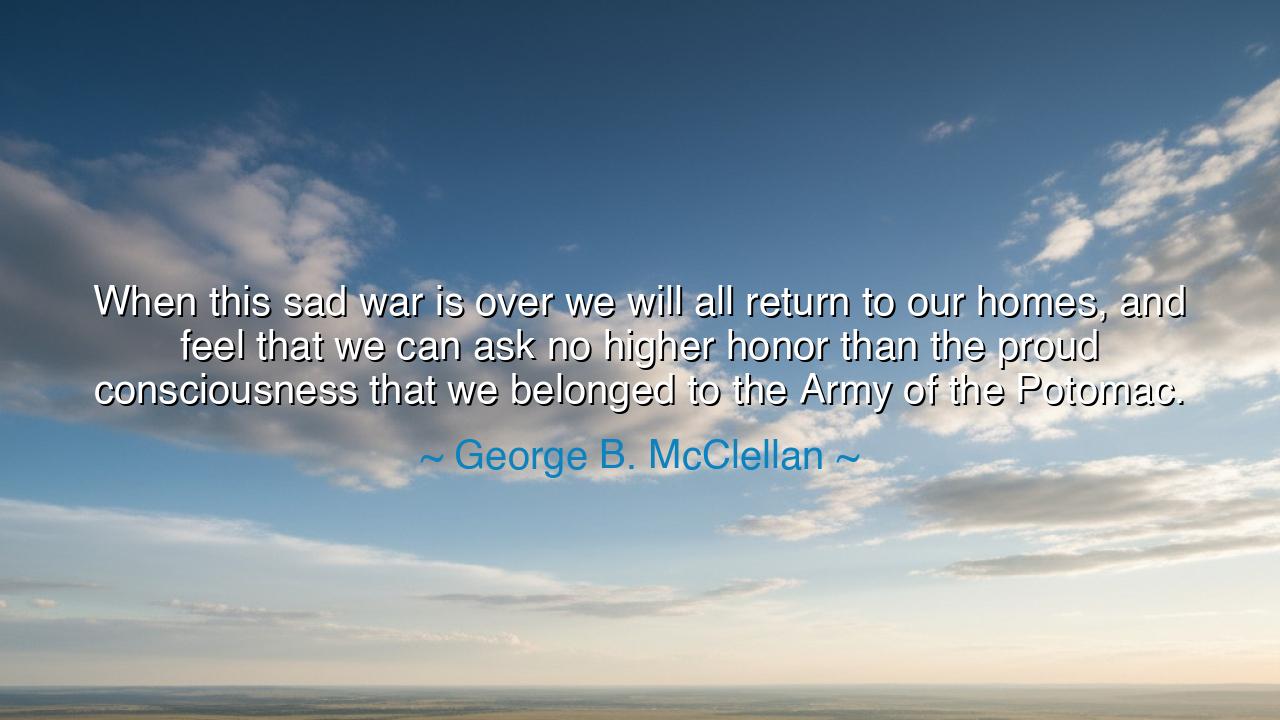
When this sad war is over we will all return to our homes, and
When this sad war is over we will all return to our homes, and feel that we can ask no higher honor than the proud consciousness that we belonged to the Army of the Potomac.






George B. McClellan, commander of the Union Army in the earliest, most uncertain years of the Civil War, once spoke words that still carry the weight of history: “When this sad war is over we will all return to our homes, and feel that we can ask no higher honor than the proud consciousness that we belonged to the Army of the Potomac.” Though uttered in the shadow of bloodshed and division, these words shine with a light of unity, sacrifice, and enduring pride. For McClellan reminds us that true honor lies not only in victory, but in the shared memory of having stood together in a time of trial.
The Army of the Potomac, though often criticized for its cautious leadership, carried the burden of defending the very heart of the Union. They fought at Antietam, at Fredericksburg, at Gettysburg, where rivers of blood baptized the soil of a divided nation. McClellan, a general both beloved and controversial, saw in his men not only soldiers, but citizens who would one day return to homes forever changed by the smoke of war. His words gave them a vision beyond battle: that even in sorrow, there is dignity in belonging to something larger than oneself.
The ancients knew this truth as well. The warriors of Thermopylae, though doomed to fall, bore their sacrifice with pride, for they belonged to the brotherhood of Sparta. They asked no higher honor than to be remembered as those who stood at the gate and held the line. In the same spirit, McClellan spoke to his soldiers: though the war was long and grievous, to have been part of the Army of the Potomac was itself an eternal badge of courage.
There is deep sorrow in his phrase, “this sad war.” He acknowledges that no glory can erase the tragedy of brothers fighting brothers, of homes divided, of fields soaked in blood. Yet within this sadness he finds hope: that after the struggle, men would carry with them the proud consciousness of their service. It is a paradox the ancients understood well—that suffering and honor often walk hand in hand, that the weight of sacrifice makes pride shine brighter.
History offers us many such examples. Consider the soldiers of World War I, who endured the trenches of the Somme and Verdun. When the war ended, many returned broken in body, haunted in spirit. Yet among them was also a quiet pride: that they had endured, that they had stood for their nations, that they had belonged to something greater than themselves. The Army of the Potomac, like the soldiers of that later age, carried scars that never fully healed, but also a memory that no one could take away.
The lesson here is that belonging to a cause greater than self transforms even suffering into meaning. We live in a world that prizes individual triumphs, yet McClellan reminds us that the highest honor is often found in collective struggle, in the bonds forged in hardship, in the legacy of standing together when times were darkest. To share in that memory is to know that your life was part of a story larger than your own.
Therefore, let us remember this: when hardship comes, do not ask only how you may survive it, but how you may belong to something greater through it. Stand with others, endure together, and carry away not just wounds but pride in the unity you created. For when the sad war of your own life ends—whether it be battle, hardship, or trial—your highest honor will not be in what you gained for yourself, but in the consciousness that you stood firm with others, that you gave your strength to something that will outlive you.






AAdministratorAdministrator
Welcome, honored guests. Please leave a comment, we will respond soon